Auto Racing in Maine: 1911
by James Merrick
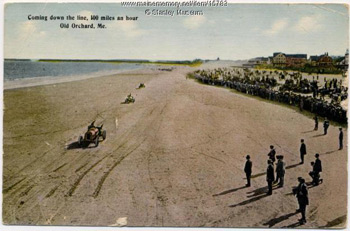
Auto racing at Old Orchard Beach began in 1911. The start and finish line was the pier. Googins’ Rocks was the southern most turning point. The car in this image sports an E-M-F insignia, indicating a car manufactured by the Everitt-Metzger-Flanders Company of Detroit, an early competitor of Henry Ford.
Images from Stanley Museum, Maine Historical Society, McArthur Public Library, and Maine Historical Society/MaineToday Media
In the early 20th Century auto racing was a novelty, attracting crowds of fascinated spectators, many of whom could hardly afford one of the new machines. Carmakers and dealers soon began to enter factory cars and professional drivers in local races, hoping to win events, enhance their cars’ prestige, and attract potential customers.
In rural areas, auto races and exhibitions were first held at local harness racing tracks, and sometimes along roads or beaches that could be closed to traffic. Hill climbing events were very popular, as it was then considered an important test for early touring cars. Beach racing came into vogue up and down the Atlantic coast wherever long, flat straight-aways exposed by receding tides allowed for unobstructed speed racing.
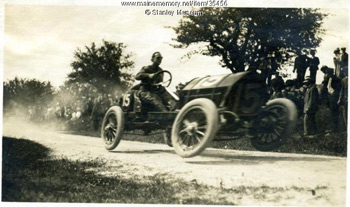
Fred W. Belcher powers his 60 HP Knox stock car, No. 15, over the crest of Thurlow Hill in South Poland. The Maine Automobile Association sponsored the Thurlow Hill Climb. Belcher drove an exhibition run over the two-thirds-mile course in 48.2 seconds. At one point his car sailed through the air an estimated 32 feet as later paced off by witnesses.
In 1911, some of the first organized auto races were held in Maine. In June, the Maine Automobile Association and Hiram Ricker & Sons of Poland Spring organized a major hill-climbing event on Thurlow Hill (now known as Range Hill Road) in South Poland. September ushered in the first speed races at Old Orchard Beach, sanctioned by the American Automobile Association. Drivers and cars came from all over New England to compete for prizes and honors at these events.
Within a few short years, however, races on open roads and beaches in Maine were a thing of the past. Poor road conditions and lack of crowd control created many safety issues for drivers and spectators alike. Perhaps more telling was the inability of race promoters to close off and charge admission to events held on public roads and beaches. Soon auto races would only be held within the confines of racetracks in Maine and across the country.
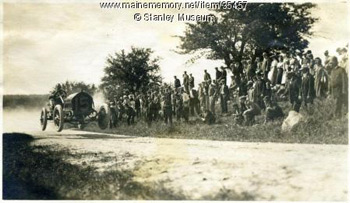
Fred W. Belcher races his Knox stock car in the Thurlow Hill Climb in South Poland, June 17, 1911. Racing early cars on dirt roads lined with spectators was often dangerous, as Belcher's car frequently went airborne over bumps in the road. On one run, Belcher lost control of his racer, hit a tree and was thrown from the car. He was not badly hurt and was able to continue the race, scoring the fastest run of the day.
James Merrick is the archivist of the Stanley Museum and the author of two recent books on early racing history published by the Museum: "We will try this hill": the climb to the clouds, 1904-1905 (2004) and Bravo, Stanley!: the racing history of Stanley and the 1906 Stanley land speed record (2006).
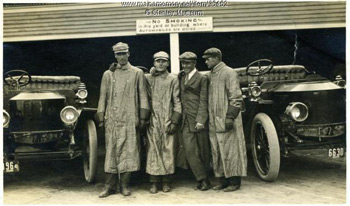
Three motor coachmen in identical road gear stand with their cars in front of the garage at the Poland Spring Resort in 1911. The cars are nine-passenger Stanley Mountain Wagons, powered by 30 hp steam engines, the forerunners of modern-day passenger buses.
The Ricker family of Poland Springs owned three of these large vehicles to take guests and their luggage up the long climb from the railroad depot 6 1/2 miles away to the Poland Spring Hotels. Operating early motor cars over Maine roads for paying customers was a challenging job, and these early chauffeurs shared a special camaraderie.
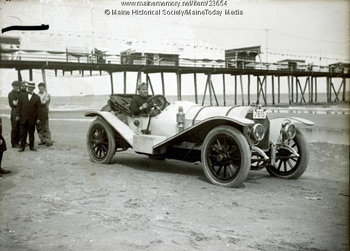
Competitive auto racing on Old Orchard Beach probably began as early as 1903 although the first recorded formal race was in 1911. The last was in 1913.
The car in this image is a circa 1911 Locomobile Runabout, built in Bridgeport, Connecticut.
The car is fully equipped with road accessories and is registered with 1912 Massachusetts plates, indicating that it is a private car and its owner is taking advantage of the closed course to make an informal speed run on the beach.
